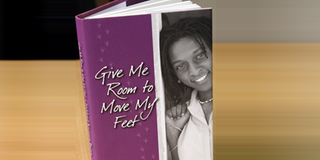100 poems to tickle your mind and soul

The cover of Barya’s book Give Me Room to Move My Feet
What you need to know:
Barya delves into the contradictions about love, loss, and betrayal – by the selfish who took advantage of idealists and by the lover who after goading us on preferred to be somewhere else.
In her latest anthology, Ugandan poet Mildred Kiconco Barya tackles issues such as the relevance of our cultural heritage in modern times, time and space, wars, poverty, love, pain, betrayal, shattered dreams, sex and death.
Titled Give Me Room to Move My Feet, and published by Amalion Publishing, the collection has 100 poems that fall among seven parts: revolving lives, stormy heart, before the sun sinks, the pain of tenderness, shame has a place, the shape of dreams and until the last breath is drawn.
The theme of domestic violence is captured in the poem The Perfect Match. The wife threatens to divorce because she picks up the laundry, empties the bin and attends family planning sessions. The husband brings her the job pages so she may try her luck, but she prefers staying home watching television. He points fingers and picks up an axe, children take cover under the beds and she flees to the cattle shed.
The clash between modern and native diets is played out in the poem What’s Native Can’t Harm You. A ‘polished’ woman visits her mother upcountry with packed tinned foods and waffles. The grandmother wil not understand why her grandchildren cannot take the ripe mangoes, oranges and the tangerines that are in plenty. “They’ll catch a fever if they eat this and that,” she is told. The grandchildren eventually eat their packed junk food – and they end up stunted like fishermen’s hooks.
The poem The Place Where you Begin (The Third World),” highlights the challenges of the least developed world. It is a disorganised place plagued with basic lacks and wants, regular electricity, flowing water and hygiene. In the poem Skipping, she writes that people believe that their creator blesses other generations and skips theirs.
Barya observes that we fear to touch pain and are afraid of how it exposes us, and if only we knew we own it. “You can always see the look of pain whichever spot you stand, in the empty eyes of children huddled on the streets, in the familiar heartache songs you hear, in the frenzied beats of the drums, in the wound that pound with a rhythmic echo, universal pain,” the poem The Look of Pain, goes in part.
The dreadful Monday mornings are depicted in the poem Monday Mornings. They come with a lot of indigestion, constipation, exhaustion, hang-ups and hangovers. We do not hesitate to rejoice when it turns out to be a public holiday – then we extend the weekend.
Love, pain, jealousy and anger are medical conditions to be assuaged with homeotherapy and grandma remedies, is what Medical Conditions suggests.
In Miracle Inside, she sits in the chapel trying to make sense of the white-washed walls, why the heart cannot be that clean, and why the spirit must keep seeking.
She compares the natural beauty of the Sipi Falls in Kapchorwa in eastern Uganda to the Mississippi in the USA in Sipi.
“I wish depression had a cure,” goes the shortest poem, A Wish. In Dream Carriers, she asks how it feels to watch your dreams slip from your reach. Is it like losing ground in a job interview breaking you in cold sweat?
According to Peter Nazareth, professor of English and advisor, International Writing Programme, University of Iowa, USA, “In 100 thought-provoking textually original poems, Mildred Kiconco Barya explores elements of time and space on the landscapes of memory, observation and experience at individual points and collective levels…”
Barya’s first book of poetry, Men Love Chocolates But They Don’t Say (2002) won the National Poetry Award in Uganda. Her second collection, The Price of Memory After the Tsunami was published in 2006. Her short stories include Scars of Earth, Effigy Child, Those Days of Ebola, and Land of My Bones.
Barya was born in Uganda and studied at Makerere University, Uganda; Moi University, Kenya and the International Women’s University in Germany.




